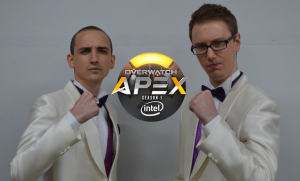Anyone watching an Overwatch tournament has experienced a moment where you’re watching an intense play but are having trouble following the action on screen. Admit it. We’ve all felt that way before.
Luckily, we get to sit back as viewers to process the information. The casters, on the other hand, have to narrate the activity every step of the way.
This is no easy feat.
Challenges
Esports casters specialize for specific games. They isolate important events, interpret the plans of either teams, and use information from before and during the game to project future events. But most importantly, they combine all of this to form a relatable narrative for the viewer.
Overwatch presented a fresh challenge. While most other games have static phases and discrete gameplay, Overwatch is packed to the brim with action from start to end. Casters don’t have laning phases or eco rounds to build stories. The cluster of activity needs to be interpreted at all times as it bounces through the map.
Evolution of Casting
Although there were some bad casts as the scene emerged, we luckily weren’t in the privileged position of the present to interpret them as such. As the players developed their skills and knowledge of the game, so did the casters. What’s a good cast? How do you relay good analysis? How do I set myself apart from the rest? In a rapidly growing field of hard-working casters, such questions became paramount to make a mark in the scene. Much like the pros fighting for the trophies, the casters pushed to grab a spot in Blizzard’s first major event.
You May Like
Advances

Soon personalities began to bring new flavor to the show. New insights emerged that allowed the shows to evolve from simple play-by-play regurgitation to a more colorful interpretation.

ZP and Hexagrams were the first to provide a steady show – ZP, with his experience as the most prolific Overwatch caster to date, in combination with Hexagrams, who has an uncanny ability to connect his partner’s thoughts. ZP and Hex brought a new level of professionalism to the craft as the first casting duo to seamlessly squash dead-air moments.
Advances by other casters soon followed. Uber impressed with his deep knowledge of the players at a time when it was hard to know much at all. Combined with Kaplan’s rigorous knowledge of character interactions, viewers could feel primed for ensuing team fights.
MonteCristo contributed similar insight. Who is the focus? Who’s in danger? Who are the early-game priority targets? Monte highlights the building blocks that are needed to interpret ensuing events.
Prediction
Overwatch casting will have the highest skill cap out of any esport so far. Watch and see. I’m uncharacteristically optimistic in that regard. At this rate of improvement, the casters might just get so good that we’ll forget about the abysmal lack of spectator tools.
But maybe that’s a tad bit too optimistic.

















